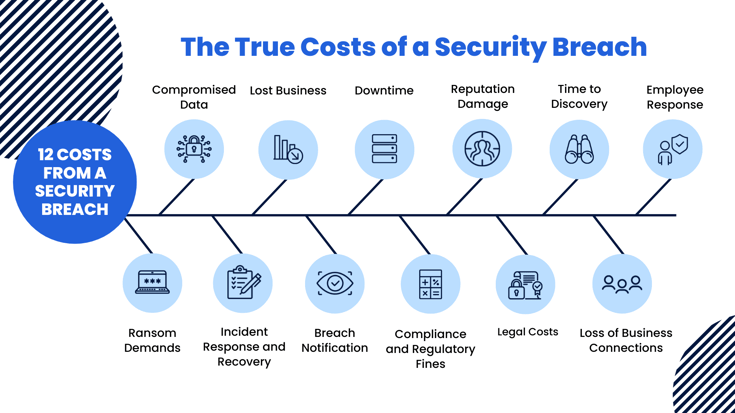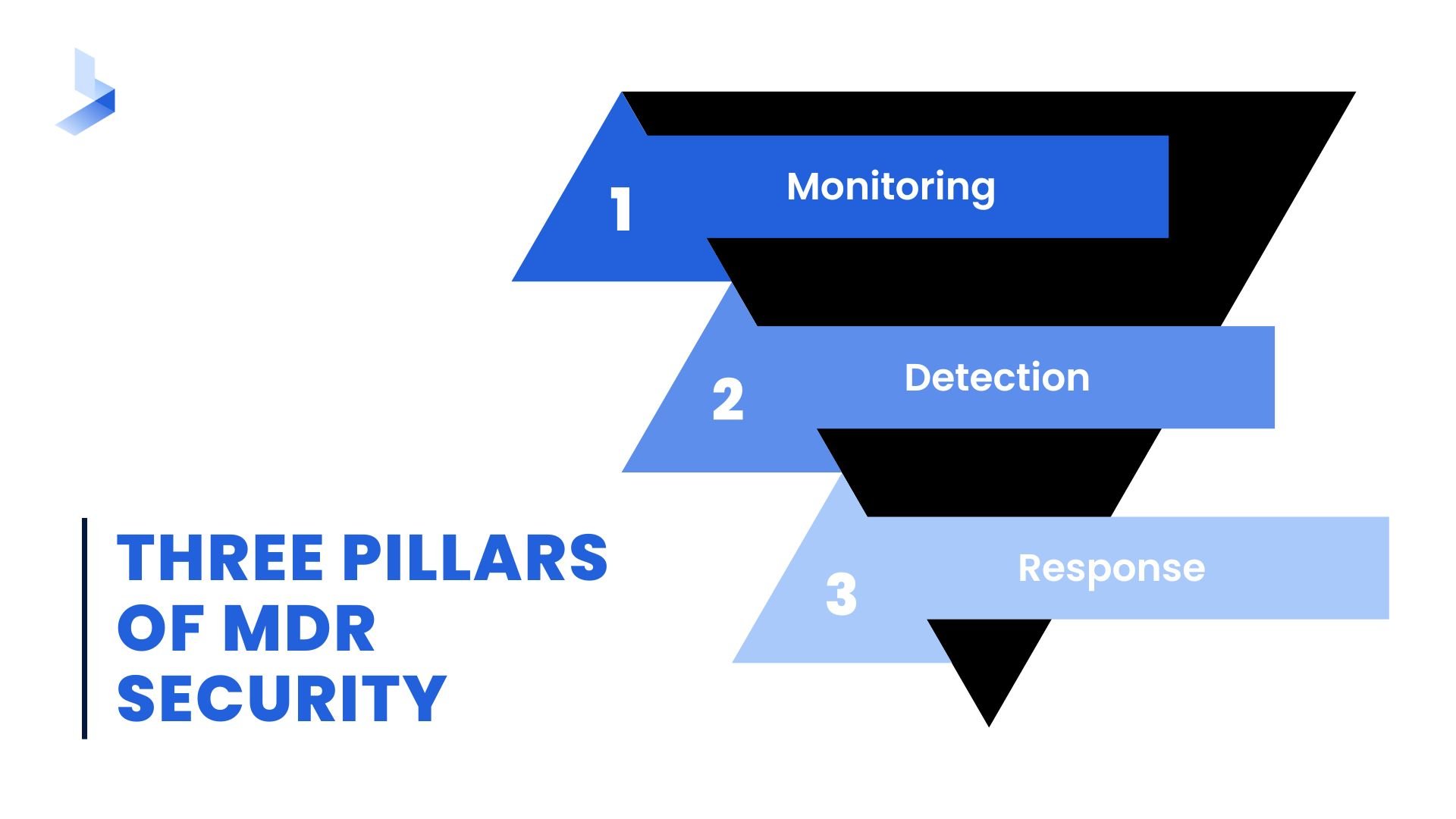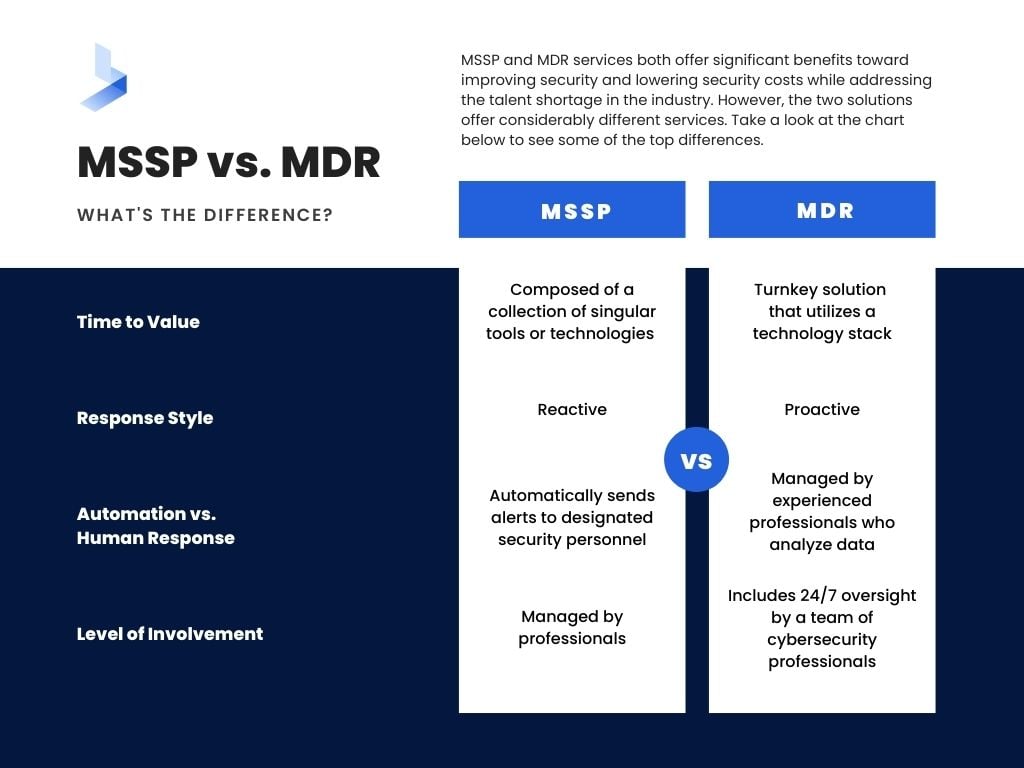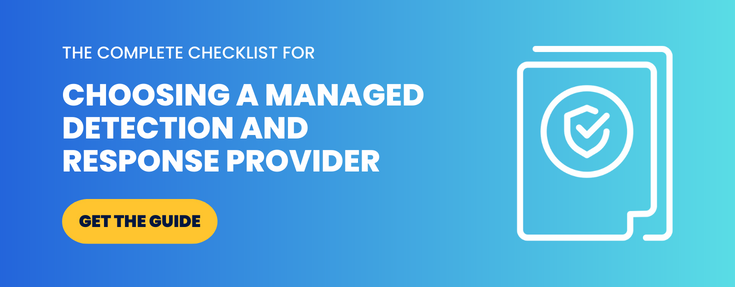The Essential Guide to Understand MDR Cybersecurity

 By
Emily Miller
·
10 minute read
By
Emily Miller
·
10 minute read
In today's rapidly evolving digital landscape, cybercrime is striking businesses with alarming frequency. Companies caught off guard by these threats face significant financial, reputational, and structural consequences.
Enter MDR security—a cutting-edge service offering comprehensive, round-the-clock monitoring and protection for your company's networks and data. With real-time threat identification and response, as well as expert guidance on mitigating future risks, MDR cybersecurity is becoming indispensable for organizations of all sizes.
In this guide, we'll unravel the essentials of MDR cybersecurity and delve into its significance for businesses. Additionally, we'll provide valuable tips on selecting the ideal MDR provider tailored to your unique requirements.
Whether you're just beginning your cybersecurity journey or seeking a more robust security solution, this guide has something for everyone. So, dive in and unlock the secrets of MDR cybersecurity.
Navigating the Turbulent Cybersecurity Landscape
Cybersecurity has become a paramount concern for organizations of all sizes. A recent study revealed that cybercrime ranks as the second most prevalent form of crime, trailing only fraud.
Numerous factors contribute to this reality. Primarily, the staggering costs associated with data breaches can be catastrophic for businesses, with expenses steadily increasing each year.
Beyond the direct financial implications, data breaches can inflict lasting reputational harm, erode customer trust, and incur regulatory penalties. Moreover, the emotional impact on employees who fall victim to identity theft or other cybercrimes cannot be underestimated.
Given the high stakes involved, it is no surprise that businesses are fervently exploring avenues to bolster their cybersecurity defenses.

Top Three Challenges of Security Teams
In the dynamic world of cybersecurity, IT professionals face a myriad of challenges to keep their organizations safe from ever-present threats. Among these hurdles, three key issues stand out as particularly pressing for security teams. By understanding and addressing these challenges, businesses can better prepare for the evolving landscape of cyber risks and protect their valuable assets.
Managing Data Volume and Distribution
The first challenged faced by IT teams is the sheer volume of data that companies must now protect. In the past, most data was stored on-premises in physical servers. With the rise of cloud computing, businesses are storing more data off-site. This is convenient in many ways, but it also creates new cybersecurity risks. Businesses must now secure data spread across multiple locations and devices.
Staying Ahead of Evolving Cyber Threats
The second challenge is the constantly evolving nature of cyber threats. There are new daily threats, and it can be challenging to keep up. Cybercriminals are constantly finding new ways to exploit vulnerabilities. In addition, the attacks are getting more sophisticated. Many now use AI and machine learning to target businesses at scale. This makes it even harder for companies to defend themselves.
Addressing the Cybersecurity Talent Shortage
The third challenge is the shortage of security teams. There are not enough qualified people to fill all the open positions. This shortage is only expected to grow in the coming years. As a result, businesses must get creative in their recruiting efforts. They may need to offer more competitive salaries and benefits or provide training and development opportunities.
These are just some of the challenges businesses face in the cybersecurity space. While it can be daunting, there are steps you can take to improve your security posture.
| Related Reading: Top Challenges and Solutions for Small IT and Security Teams |
The Foundation of MDR Cybersecurity
MDR cybersecurity stands firmly on three crucial pillars: monitoring, detection, and response.
Monitoring, or prevention, is arguably the most critical pillar of MDR cybersecurity. This pillar comprises proactive measures such as patch management and user education to help thwart phishing attacks.
Detection involves the capability to identify threats as they occur, encompassing not only the recognition of malicious activities but also grasping the intent behind them and their potential repercussions.
Response focuses on taking decisive action to neutralize threat intelligence, which may include quarantining infected devices, halting suspicious processes, or engaging law enforcement.
By proactively working to prevent attacks before they materialize, your business can save significant time, money, and resources. Moreover, prevention helps you sidestep the need for a costly and disruptive incident response plan.

Features of Managed Detection and Response
Prioritization of Cybersecurity Risks
One of the essential benefits of MDR cybersecurity is its ability to prioritize risks. With so many potential threats, it can be tough to know where to focus your limited resources.
An MDR provider will use automated tools and human expertise to identify the risks that pose the greatest threat to your business. They will then work with you to develop a plan to mitigate these risks.
This prioritization of risks is an essential part of MDR endpoint security and can save your business a lot of time and money in the long run.
Threat Hunting
In addition to identifying and responding to threats detected in real-time, MDR cybersecurity providers also offer threat hunting services.
Threat hunting is the proactive search for signs of malicious activity. This might involve looking for unusual patterns in network traffic or analyzing user behavior.
By proactively searching for threats, MDR providers can help you stay one step ahead of the attackers. This can be a vital service for businesses that are constantly under attack.
| Related Reading: What Is Cyber Threat Hunting? |
Investigation and Reporting
MDR providers will also investigate any incidents that do occur. This might involve looking for evidence of data exfiltration or identifying the source of an attack.
After an incident has been investigated, the MDR provider will produce a report. This report will detail the findings of the investigation and make recommendations on how to avoid similar incidents in the future.
The report can be an invaluable resource for businesses that want to improve their security operations center SOC. It can also help you satisfy any compliance requirements that you might have.
Guided Response
One of the most valuable features of MDR cybersecurity is guided response. This refers to the assistance that MDR providers offer during an incident.
A guided response can take many forms, but it typically involves expert advice on neutralizing a threat. This might include quarantining infected devices or stopping suspicious processes.
Sometimes, the MDR provider might even take action on your behalf. This can help significantly during a significant incident when every minute counts.
Remediation
After an incident has been dealt with, the MDR provider will work with you to remediate any exploited vulnerabilities.
This might involve patching systems or updating software. It could also include changing user permissions or implementing new security controls.
Remediation is an essential part of MDR cybersecurity and can help prevent future incidents.
User Education
Finally, MDR providers will also offer user education services. This is designed to help employees avoid falling victim to phishing attacks and other social engineering techniques.
User education typically takes the form of training courses and awareness programs. These can be invaluable resources for businesses that want to improve their cybersecurity posture.
MDR cybersecurity can offer a massive host of benefits for your company. By taking steps to prevent attacks before they happen, you can save your business a lot of time, money, and headaches.
| Related Reading: What is Managed Detection and Response? MDR Security 101 |
Why MDR Security Is So Important
In today's business environment, cybersecurity is more important than ever. The rise of digital transformation has led to an increase in the number of cyberattacks, as well as the severity of these attacks.
Moreover, traditional security solutions are no longer enough to keep businesses safe. This is because they are designed to protect against known threats; they cannot detect or respond to new or unknown advanced threats.
MDR cybersecurity addresses this problem by providing continuous monitoring and protection against known and unknown threats. By doing so, MDR can help you keep your business safe from even the most sophisticated attacks.
Moreover, MDR cybersecurity can help you save money in the long run. This is because it can help you avoid the costs associated with data breaches, such as downtime, reputation damage, and regulatory fines.
Businesses That Must Consider MDR Cybersecurity
Any business that stores, processes, or transmits sensitive data must consider MDR cybersecurity. This includes companies in the healthcare, finance, and government sectors.
Additionally, any business that is required to comply with data security regulations, such as HIPAA or GDPR, must implement MDR cybersecurity.
If you're unsure whether your business needs MDR cybersecurity, we recommend speaking to a qualified provider. They will be able to assess your specific needs and requirements.
Benefits of MDR Services
There are many reasons to consider MDR cybersecurity for your business. Here are just a few of the benefits you can expect:
Improved security posture: By 24/seven monitoring and protection, you can rest assured that your company's data is always safe.
Threat detection and response: With MDR services, you will have a team of experts working around the clock to identify and respond to threats.
Prevention: As we mentioned, prevention is key to protecting your business from future attacks.
Peace of mind: Knowing that your business is protected can give you peace of mind and allow you to focus on other aspects of your business.
Cost savings: MDR services can actually save you money in the long run by preventing costly data breaches.
Should You Build In-House Cybersecurity or Outsource MDR Services?
Whether to build in-house cybersecurity or outsource MDR services is one that all businesses must make. There are pros and cons to both approaches, and the best solution for your business will depend on several factors.
Some businesses opt to build in-house teams because they believe this will be more cost-effective in the long run. However, this approach requires a significant upfront investment, as well as ongoing training and maintenance costs.
Moreover, building an in-house team can be challenging, especially if you do not have experience in cybersecurity.
It can be difficult to find and retain qualified staff, and you may not have the resources to provide them with the latest tools and technologies.
Outsourcing MDR services can be a more cost-effective and efficient solution for many businesses. With outsourcing, you can benefit from the expertise of an experienced team without having to make a significant upfront investment.
In addition, outsourcing provides you with the peace of mind that comes with knowing your business is protected by experts. This can allow you to focus on other aspects of your business and free up valuable resources.
Examples of Inadequate vs. Exceptional Managed Detection and Response Services
When selecting an MDR service provider, it's crucial to find one that aligns with your business needs and offers high-quality services. MDR providers can vary significantly in their offerings, so it's essential to discern between inadequate and exceptional providers. Here are some characteristics of both:
Inadequate MDR Service Providers
Inadequate MDR service providers tend to prioritize sales over the security of your company. They may apply pressure to sign a long-term contract before you're confident in their services or attempt to upsell you on additional features that aren't necessary for your business.
Their focus on sales may also result in subpar security services, outdated tools and technologies, and a lack of customization to cater to your organization's unique requirements.
Exceptional MDR Service Providers
In contrast, exceptional MDR service providers prioritize the protection of your company and strive to deliver the best possible customer experience. They invest time in understanding your specific needs and tailor their services to address those requirements effectively.
These providers employ a team of highly skilled and experienced security analysts who are well-versed in the latest tools, technologies, and threat intelligence. They actively monitor your network, swiftly detect threats, and respond efficiently to mitigate risks.
Furthermore, exceptional MDR providers offer transparent communication, flexible contracts, and continuous support to ensure your business remains secure and well-prepared for the evolving cybersecurity landscape.
How to Implement MDR Cybersecurity
If you've decided that MDR services are right for your business, the next step is to implement a solution. Here's how to get started:
First, you'll need to select an MDR service provider. As we mentioned above, it's important to choose a provider that is a good fit for your company. We've done some of the homework for you and outlined some of the top MDR services here.
Next, you'll need to sign a contract with the MDR service provider. This will outline the terms of the agreement and specify the services they will provide. Once the contract is in place, the MDR service provider will begin monitoring and detecting threats to your company's data 24/7. They will also provide you with regular reports on their findings.
If there are any potential threats, the MDR service provider will take action to mitigate them. This may include quarantining infected files or blocking malicious traffic.
Furthermore, the MDR service provider will work with you to develop a response plan in the event of a data breach. This plan will outline the steps you need to take to minimize the damage and protect your company's data.
Alternatives to MDR Cybersecurity Solutions
MDR cybersecurity solutions are not the only way to protect your business. You may also consider other options, such as managed security services (MSS) or security information and event management (SIEM).
Both MSS and SIEM can offer similar benefits to MDR services. However, they differ in terms of cost, complexity, and features. For example, MSS is typically more expensive than MDR but offers more comprehensive protection.
Ultimately, deciding which solution will come down to your specific needs and budget.
If you're looking for a comprehensive solution that offers the best possible protection, MSS may be the right choice for you. However, if you're on a tight budget, MDR may be a better option.
No matter which solution you choose, the important thing is that you take action to protect your business from data breaches. Cybersecurity is an essential part of running a successful company in the 21st century.
MDR vs EDR: The Differences
EDR is a more traditional style of cybersecurity that focuses on detection and response. MDR, on the other hand, is a newer model that takes a proactive approach to security. Moreover, MDR services are typically more expensive than EDR.
MDR services are designed to identify and stop threats before they cause any damage proactively. This is done through a combination of technology, processes, and people.
The main difference between MDR and EDR is that MDR focuses on prevention while EDR focuses on detection and response. By taking a proactive approach, MDR can help to prevent data breaches before they happen.
| Related Reading: EDR vs MDR vs XDR: How They Differ and Which One is Right for You |
MDR vs SIEM: The Differences
SIEM stands for security information and event management.
It is a type of cybersecurity that focuses on collecting and analyzing data to identify potential threats. Furthermore, SIEM can also be used to monitor and respond to security incidents.
.jpg?width=1920&height=600&name=MDR%20VS%20SIEM%20(1).jpg)
MDR, on the other hand, stands for managed detection and response. MDR cybersecurity is a service that proactively detects and responds to threats. It uses technology, people, and processes to identify and mitigate threats.
MDR vs MSSP: The Differences
Security services provider MSSP stands for a managed security service provider.
It is a type of cybersecurity that focuses on providing comprehensive protection for businesses. In addition, MSSP can also offer other services such as monitoring and incident response.
MDR, on the other hand, takes a more proactive approach to security. MDR services are designed to identify and stop threats before they cause any damage proactively.
MDR is a newer type of cybersecurity that has become increasingly popular in recent years.
How to Choose An MDR Provider the Right Way
There are a few things you should keep in mind when choosing an MDR provider.
First, you need to make sure that the provider offers comprehensive protection. The provider should also have experience dealing with threats specific to your industry.
You should also consider the cost of the service. MDR services can be expensive, so you'll want to ensure the price is worth it. Finally, you'll want to read reviews of the provider to see what other people think about their services.
You can better vet your MDR providers by asking questions like these:
- How long has the provider been in business?
- What is the provider's success rate in stopping attacks?
- How quickly can the provider respond to incidents?
- What is the provider's reputation like?
- How much does the service cost?
An MDR solution can offer a host of benefits for your business. But you must choose an MDR provider carefully.
By following these tips, you can be sure to find a reputable and reliable provider that offers comprehensive protection for your company.
MDR Cybersecurity Awaits You
MDR cybersecurity is an essential tool for protecting your business. While there is a cost associated with these services, the benefits far outweigh the expense. If you want to protect your company from data breaches, MDR services are the way to go.
No matter which solution you choose, the important thing is that you take action to protect your business from data breaches. Cybersecurity is an essential part of running a successful company in the 21st century.
If you'd like to try out MDR cybersecurity in your business, get in touch with us today. We'll be happy to answer any of your questions and get you started with our services.
